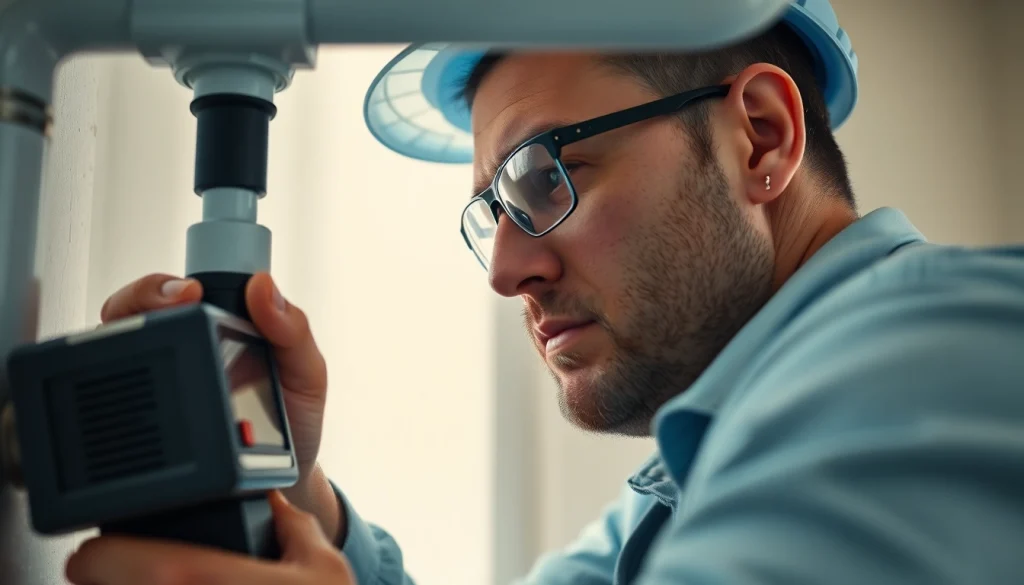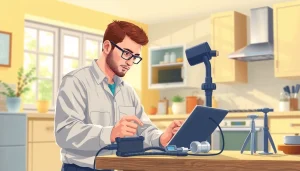
Understanding Specialist Leak Detection
What is Specialist Leak Detection?
Specialist leak detection involves the use of advanced techniques and technologies to identify and locate leaks in plumbing and construction systems. Unlike traditional methods, this approach minimizes or eliminates the need for invasive measures that could potentially damage the property. Through specialized equipment, leak detection professionals can pinpoint the source of leaks with high accuracy, allowing for timely repairs and maintenance.
This service is crucial for both residential and commercial properties, as leaks can lead to significant damage if not detected early. The expertise of a leak detection specialist goes beyond basic plumbing; they employ advanced techniques such as acoustic testing, thermal imaging, and moisture meters to find hidden leaks behind walls, under floors, and even beneath the ground. For effective and timely solutions, homeowners often seek Specialist Leak Detection services that ensure their property remains in optimal condition.
Importance of Early Leak Detection
Early detection of leaks is paramount in preventing water damage and other related issues. Water leaks, if left unchecked, can lead to mold growth, structural damage, and increase water bills. Understanding the implications of delayed leak detection can compel property owners to invest in professional services proactively.
By identifying leaks before they escalate, specialists help homeowners save on costly repairs. Early detection is vital for maintaining property value, as even minor leaks can become significant problems over time, affecting not only the aesthetics of a home but also its structural integrity.
Common Causes of Water Leaks
Water leaks can be attributed to various factors, some of which include:
- Wear and Tear: Over time, plumbing materials can degrade, leading to leaks. This is especially true for older homes where pipes may be made from outdated materials.
- Temperature Fluctuations: Extreme weather conditions can cause pipes to expand and contract, potentially leading to cracks and leaks.
- Improper Installation: During construction or renovations, mistakes in installation can create weak points in the plumbing system.
- Root Intrusion: Tree roots can invade sewer lines, causing blockages and cracks which can lead to leaks.
Benefits of Specialist Leak Detection
Cost Savings through Early Detection
Investing in specialist leak detection services can lead to significant cost savings for homeowners. By catching small leaks before they become major problems, property owners can avoid extensive repairs that could cost thousands. For instance, a minor leak can result in low water bills if detected early; however, a leak that is left unattended may lead to water damage that requires major renovation work and higher utility expenses.
Furthermore, many insurance policies cover damages caused by leaks, but only if you can demonstrate that you took reasonable proactive steps to prevent extensive damage. Regular leak detection can serve as proof of diligence, potentially saving homeowners from hefty out-of-pocket expenses.
Reducing Property Damage Risks
Effective leak detection plays a critical role in reducing the risk of property damage. Unchecked leaks can lead to severe issues such as foundation damage, rot from moisture buildup, and hazardous mold growth, all of which not only decrease the home’s value but can also pose health risks to the inhabitants. By routinely employing specialist leak detection services, homeowners can minimize these risks effectively.
Moreover, many leak detection specialists provide remediation services as well, ensuring that once a leak is found, the necessary repairs can be carried out efficiently, further preventing any potential damage to property.
Increasing Home Value with Proper Maintenance
Maintaining a leakage-free home is vital for preserving and even increasing property value. Homes that are well-maintained with no history of plumbing problems are more attractive to potential buyers. When properties are listed, evidence of proactive leak detection and repairs can serve as a selling point, demonstrating that the homeowner has taken steps to protect their investment.
This not only applies to aesthetic values but also reassures buyers of the integrity of the home’s infrastructure. Conducting regular leak detections can thus be seen as a wise investment, showcasing responsibility and care for the property.
Innovative Techniques in Specialist Leak Detection
Non-Invasive Technologies Explained
Non-invasive technologies are revolutionizing the way leaks are detected in residential and commercial settings. These methods allow specialists to identify leaks without extensive digging or damaging walls. Techniques like infrared thermal imaging, acoustic detection, and moisture testing are leading the way in providing quick and accurate leak assessments.
The essence of non-invasive methods lies in their ability to provide detailed insights into plumbing systems without invasive procedures. This not only saves time but also minimizes disruption to the property.
How Thermal Imaging Works
Thermal imaging technology is based on the principle that water leaks produce temperature variations compared to their environments. By using thermal cameras, specialists can identify these discrepancies and locate leaks without the need to tear through walls or floors.
This method is particularly effective in detecting leaks in hidden areas, such as underneath floors, behind walls, and even in roofs. Thermal imaging can reveal not only the location of the leak but also provide insights into the extent of the problem, allowing for targeted repairs.
The Role of Acoustic Detection Methods
Acoustic detection methods utilize sound to locate leaks. When water leaks from pipes, it generates a noise that can be detected with specialized listening devices. This technique is especially beneficial for underground leaks or those in hard-to-reach areas.
Specialists trained in this method can differentiate between background noises and the unique sounds associated with leaks, providing accurate assessments that lead to prompt repairs. The effectiveness of acoustic detection underscores the importance of skilled technicians who understand how to interpret the data correctly.
Choosing the Right Specialist for Leak Detection
Qualities to Look for in a Leak Detection Expert
Selecting the right specialist for leak detection can significantly impact the outcome of the service. Homeowners should prioritize professionals who possess the following qualities:
- Experience: Look for specialists with proven experience and a strong track record in leak detection services.
- Certifications: Ensure that the technician holds appropriate certifications and training in advanced leak detection technologies.
- Technology Use: The best specialists invest in and utilize cutting-edge technology, which enhances the accuracy of their findings.
- Strong Communication Skills: A good specialist should explain their findings and recommendations clearly and be willing to answer any questions.
Assessing Customer Reviews and Testimonials
Customer reviews and testimonials serve as valuable resources when selecting a leak detection specialist. Potential clients should actively seek feedback from previous customers to gauge the quality of service provided. Look for testimonials that mention successful leak detection outcomes, responsiveness, and professionalism.
Additionally, reviews on third-party sites can provide an unbiased view of the specialist’s performance. Assessing both positive and negative experiences can help homeowners make informed decisions when hiring a leak detection expert.
Questions to Ask Before Hiring
Before hiring a leak detection specialist, it’s crucial to ask questions that clarify their expertise and approach. Consider asking the following:
- What methods do you use for leak detection?
- How long have you been in the leak detection industry?
- Do you offer a warranty or guarantee for your services?
- Can I see references from past clients?
These inquiries can help ensure that you are hiring a knowledgeable and reliable professional to address your leak detection needs.
Maintaining Your Plumbing System After Leak Detection
Best Practices for Plumbing Maintenance
Even after a successful leak detection and repair, consistent plumbing maintenance is essential for preventing future issues. Homeowners should adhere to best practices which include:
- Regularly checking for visible signs of leaks such as water stains or damp patches.
- Performing routine maintenance on appliances that use water, including dishwashers and washing machines.
- Ensuring that pipe insulation is intact to prevent extreme temperature fluctuations.
- Scheduling periodic professional inspections to catch potential problems before they escalate.
Signs of Potential Future Leaks
Being aware of the signs of potential future leaks can help homeowners address issues early. Common indicators include:
- Increased water bills without a clear explanation.
- Sudden fluctuations in water pressure.
- Unexplained standing water in low-lying areas of the property.
- Mold or mildew growth in areas with high humidity levels.
Recognizing these signs early allow homeowners to call in specialists for immediate assessments and mitigate potential damage.
How to Conduct Periodic Self-Checks
Homeowners can take a proactive approach to leak detection by conducting periodic self-checks. Some simple steps include:
- Monitoring water meter readings over a 24-hour period to spot unexpected changes.
- Inspecting exposed pipes for signs of corrosion or leaks.
- Checking toilets for silent leaks by adding food coloring to the tank—water that changes color in the bowl indicates a leak.
- Looking for water marks or discoloration in walls, ceilings, and floors.
Implementing these self-checks can empower homeowners to catch leaks early, maintaining a safe and efficient plumbing system.







